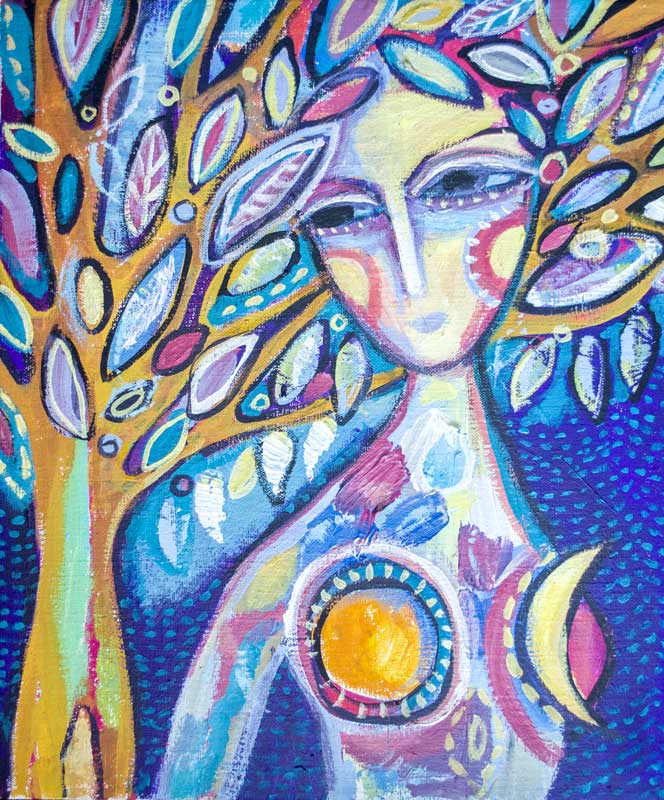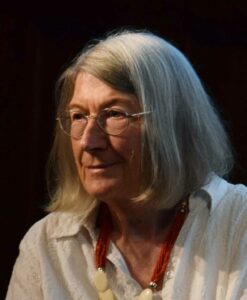What can we learn from matriarchal societies today?
Author: Heide Göttner-Abendroth
The founder of Modern Matriarchal Studies, Dr. Heide Göttner-Abendroth, shares with us the findings of her decades of research on societies living in matriarchy. She dispels clichés and prejudices about these societies. Characterizing them is egalitarianism, grassroots democracy and a deep reverence for Mother Earth. In the process, the diversity of human life forms becomes clear. But also how much Western-European societies can learn from matriarchal ones.
INTRODUCTION
Tattva Viveka: Today we are talking with Dr. Heide Göttner-Abendroth about the topic of matriarchal studies. I would like to introduce you briefly: You are a philosopher and researcher on culture and society, with a focus on matriarchy. You received your PhD in philosophy and philosophy of science from the University of Munich in 1973 and taught philosophy there for ten years. Since 1976 you have been active in pioneering work in the field of women’s studies. And you also published many books on matriarchal research, culture and society. That is why you are also called the founding mother of modern matriarchal studies.
You are one of the founders of modern matriarchal studies, including political ones. Since various – also wrong – ideas and definitions of what matriarchy could be are circulating, I’d like to ask you: How do you define matriarchy and where are the core differences to patriarchy?
Göttner-Abendroth: This question, which is so short, does contain a large part of my research. Although there is a lot of talk and collection in matriarchy research to date, even among older researchers, there is a lack of a clear definition of what this form of society looks like. In most cases, the definitions are woolly and mixed with prejudices as well as emotional statements. Therefore, when I started several decades ago, I made it my concern to examine this form of society on still existing examples, in order to find the general denominator on the basis of these living societies, what a matriarchy is at all. I could find out the following – I keep the definition short, because it is a bit extensive:
Matriarchals are organized on the social level according to the matriline and matrilocality, that is, residence in the mother’s house. These characteristics place women at the center, but not at the top. From the center, the eldest mothers hold their clans together.
Regarding the economic level, the matriarchs – the oldest mothers – behold the entire clan treasury. Everything that the clan members acquire through harvests or their work, they hand over to the matriarch.
POLITICAL MATRIARCHY RESEARCH
TV: You delimit your matriarchy research, because you call it “modern and/or political matriarchy research”. In your eyes, where is the difference between political and conventional matriarchy research?
Göttner-Abendroth: Modern matriarchy research, of which I am the founder, differs from traditional matriarchy research because it is based on scientific ground. That means, first of all, that there is a clear definition of what it actually is. In terms of traditional matriarchy research, some of the researchers don’t even know how to define matriarchies. Rather, they describe the details of different societies, but they do not define them. Then stories occur such as the following: The researcher Major Gurdon, author of the book “The Khasis”, finds a society that he wants to call matriarchy, in which men are not oppressed, but also take their roles, which they perform with dignity. That is why he writes that this is not a matriarchy.
A few pages further on, he states that men pay homage to rice liquor. From this he razor-sharp concludes that perhaps the men don’t have such future prospects after all. Perhaps they are somewhat oppressed. So it’s a matriarchy. This reveals a squishiness in the definition of the term, so they don’t know how to properly classify it. Part of the reason for this is that they start from the time-honored notion that matriarchies must be female dominions and men must be miserable there. This idea runs through all traditional matriarchal research. It is precisely these ambiguities that have given rise to the many prejudices.
MYTHS AND TALES ABOUT MATRIARCHY
Göttner-Abendroth: As a scientist, I first researched what these cultures think, how they imagine the world, what image they have of women and men. As a scientist, you can research that without any problems, just as religious scholars do everywhere. They explore the religion of other peoples without adopting the religion themselves. That’s how I’ve started, as a scientist.
But I found that matriarchal cultures are basically sacred at all levels. They also understand their economy not as an economic system, but as a spiritual one that follows Mother Nature. Mother Nature gives equally to all her children, so it would be sacrilege for them if goods were not distributed equally as a result. This is a spiritual principle. I realized more and more that these societies as a whole are based on spiritual principles in which Mother Earth or the Mother as a prototypical being distributes equally among people according to the principle of equality.
This impressed me a lot as a person and inspired me. Especially the myths, so I began to revive spiritual forms that I call matriarchal as part of the women’s cultural movement. We call this the matriarchal mystery festivals.
About the author
 Heide Göttner-Abendroth is a mother and grandmother. She earned her doctorate at the University of Munich, where she taught philosophy and philosophy of science for ten years. Through her lifelong research and her major work, The Matriarchy, she became the founder of Modern Matriarchal Studies. She was a lecturer at various universities (Bremen, Hamburg, Kassel), a visiting professor in Montréal in 1980, and a visiting professor in Innsbruck in 1992. 1986 Founded and directed the “International Academy HAGIA for Matriarchal Studies”. Direction of the three world congresses for matriarchal research. In 2012 she received an award for her research from the “Association of Women & Mythology”. She has twice been nominated for the Nobel Peace Prize.
Heide Göttner-Abendroth is a mother and grandmother. She earned her doctorate at the University of Munich, where she taught philosophy and philosophy of science for ten years. Through her lifelong research and her major work, The Matriarchy, she became the founder of Modern Matriarchal Studies. She was a lecturer at various universities (Bremen, Hamburg, Kassel), a visiting professor in Montréal in 1980, and a visiting professor in Innsbruck in 1992. 1986 Founded and directed the “International Academy HAGIA for Matriarchal Studies”. Direction of the three world congresses for matriarchal research. In 2012 she received an award for her research from the “Association of Women & Mythology”. She has twice been nominated for the Nobel Peace Prize.
www.goettner-abendroth.de
www.hagia.de
This article appeared originally on the German Homepage of Tattva Viveka: Am Anfang war die Mutter




